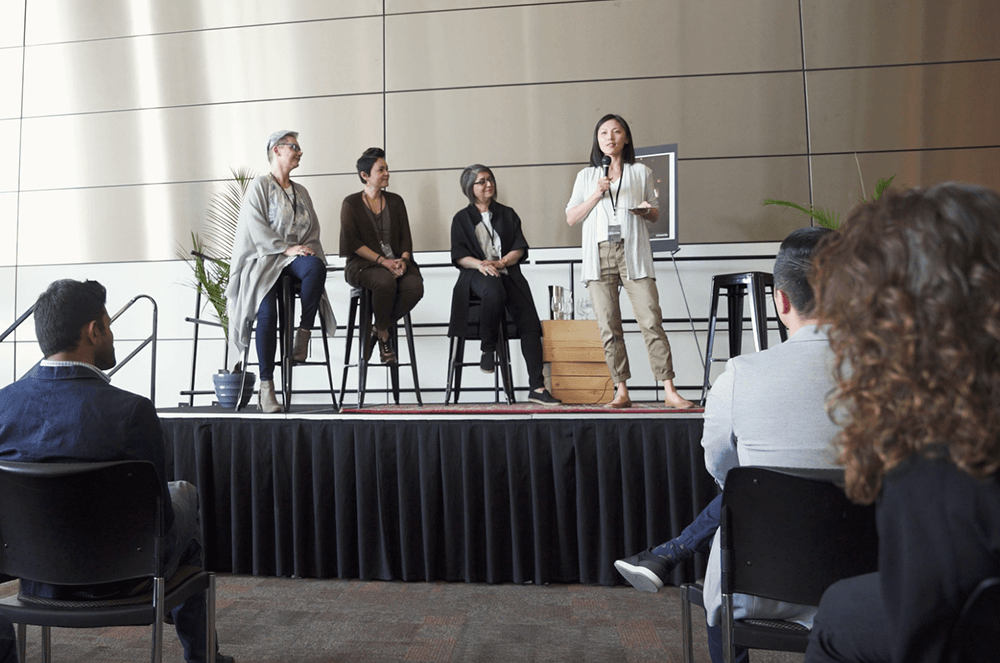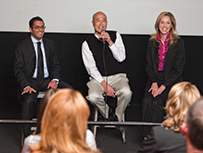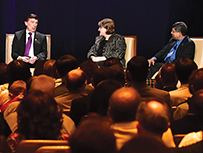
Congratulations on being selected as a conference panel moderator. As you prepare for the role, it’s essential to keep in mind your key objective: to engage and enlighten the audience. That means asking probing questions, not deliberately provocative ones, and keeping the session lively, productive, focused, and moving. The moderator’s job is not about satisfying panelists’ agendas, egos, or ambitions, nor about satiating the moderator’s personal curiosity. It’s about serving the audience, and moderators should make every decision with that objective in mind.
Below are 10 tips that best support a panel atmosphere of learning and inspiration.
1 Know the topic.
If you’re unfamiliar with the discussion topic, do research online and take notes, but make sure the articles you read are very recent. You don’t need to be an expert yourself, but you should know the fundamentals: what the topic is, how it manifests in and influences society, and how the audience will benefit from the information. Being knowledgeable also helps you develop more relevant, on-the-spot questions.
2 Know the panelists.
Try to arrange a call with your panelists ahead of time or at least meet them just before the event to establish comfort and create rapport with them, as well as field any last-minute requests or concerns. Use this time to confirm their titles and/or areas of expertise, as well as the pronunciation of their names; don’t make assumptions. Seeming unprepared about your panelists—particularly something as basic as mispronouncing their names or misstating roles—can harm your credibility.
Keep panelist names, titles, and short physical descriptions of them (“red shirt,” “sandy hair”) in an accessible place to ensure you can call on them quickly and accurately. Include phonetic pronunciation; writing “SUR-sha” for a panelist named Saoirse, for example.
3 Prepare your questions wisely.
Since most of the moderator’s job will be spent asking questions, here are a series of recommendations on question conception, construction, and delivery.
- Prepare up to 10 questions in advance. Include at least one for each panelist. Know your first question and your last question, and to whom you will ask them. Every question should elicit a revelation, valuable learning, or suggestion to the audience.
- Your first question should be fairly broad or definitional. This “softball” approach will give you and your panelists confidence and warm up the audience with a baseline of understanding.
- Rank and ask questions in order of relevance and interest to the audience. Put the name of each panelist in all caps by the question you will be asking them so you can easily lead with, “SAM, here’s one for you …”
- Keep questions short and simple, so you can improvise, contextualize, and rephrase them, and avoid getting bogged down by words. Think of the questions as thought-starters you raise, not as scripts you read word-for-word.
- It’s okay to ask the panelists in advance for questions they’d like to be asked, but scrutinize those as they come in to ensure they serve the interests of the discussion and the audience, not exclusively the panelist. (“Tell us more about the book you wrote!”)
- Finally, be careful about asking all panelists to answer the same question, even at the end. Chances are, some of those answers will be redundant, and you may get several responses like “I was going to say the same thing Paul just said.”
4 Introduce yourself and the panelists.
If you’re not introduced by someone, do it yourself. Give your name and title; remember that you are an integral part of the discussion, not just someone who simply manages it, so your credibility is important.
The moderator’s job is serving the audience, and moderators should make every decision with that objective in mind.
Introducing panelists is about quickly establishing why their insights are relevant to the discussion. Don’t share comprehensive biographies; stick to one to three details and avoid laundry lists of achievements or accolades. Sometimes a professional title says enough. And make sure the lengths of your introductions are equally balanced among panelists.
Having the panelists introduce themselves may seem like a safe move, but it can be a risky proposition because you’re handing over control. If panelists are going to introduce themselves, talk to them ahead of time about sticking to (1) who they are and (2) what they do. Explain that brevity is critical to allow adequate time for discussion and audience questions.
5 Convey the objective.
All panel discussions should elevate audience understanding in some way. So as you start, don’t just describe the discussion (“We’re going to talk about X”). Convey the impact of that discussion (“We’re going to explore how X can/will impact Y”).
6 Contextualize the questions.
To elevate spontaneity and promote a live atmosphere, contextualize prepared questions with an opening phrase like “I’ve heard that …” “I recently read …” or “Here’s a question we’ve been talking about on my team …” This tactic will help you avoid the robotic “and the next question is …” which completely marginalizes the moderator.
You can also start a question merely by connecting it to a corresponding project: “This question is about the success of last month’s campaign …” or by referencing another panelist’s expertise: “Kelly, you have experience with this from a legal perspective. Can you share …”
7 Respond to answers when it adds value.
Though you’re not a panelist, you are a panel participant, so feel free to add a quick bit of insight or agreement, or ask a follow-up question, so long as the speaking time remains balanced, and your contribution is adding meaningful value—not just more words—to the discussion.
You can also thank panelists for their individual answers but be careful not to say it after every answer. Caution: Responding with “good point” or “well said” is problematic because you don’t want to imply other panelists make lesser points or are less eloquent.
8 Spread the wealth.
It’s your job to ensure every panelist gets a moment to speak, whether you direct a question to them originally or secondarily (“Same question to you, Cynthia …”). Don’t let a single panelist dominate the discussion.
If a panelist seems to be giving a speech versus contributing a point, look for an opportunity to intervene with “Thank you, Roger” or a quick transition like “That’s a good point, Sandy. I’m interested in what the other panelists have to say about that.” You can also force a panelist to summarize by saying, “So what you’re basically saying is …” or asking a quick yes/no follow-up question.
Remember: As panel moderator, you’re acting in the interest of the audience, so it’s your job to make sure the discussion is balanced, even if you must politely intervene to enforce that parity.
9 Watch your time.
Keep track of the end-time of the discussion to ensure you have enough time to take audience questions and wrap things up. Even if live questions dry up, you can always return to your prepared ones, if you came with enough of them.
Never beg the audience for questions or wait too long for them. When you ask for questions and no one contributes, count silently to five, then move on to a backup question or something you conceive on the spot. It’s better to end a panel session a little early than have periods of awkward silence or end with time-killing irrelevance.
10 Wrap it up.
After the final question is answered, two bits of appreciation are required: Thank your panelists for their input, and thank the audience for their attendance and questions. Then proceed with the next order of business, such as handing things back to the conference organizer or announcing the next event or activity.
Remember that the panel discussion ends not with the panel’s last answer but with the moderator’s final words. Good luck and have fun!
Want to see what a virtual panel session looks like? Watch this Toastmasters International webinar on public speaking with a moderator and three panelists.
Joel Schwartzberg is a presentation coach, executive communication specialist, and author of The Language of Leadership: How to Engage and Inspire Your Team and Get to the Point! Sharpen, Simplify, and Sell Your Message. Follow him on LinkedIn.
Related Articles

Presentation Skills
How to Moderate a Panel Discussion—Virtually

Presentation Skills
How to Moderate a Panel Discussion

Communication



 Previous
Previous

 Previous Article
Previous Article